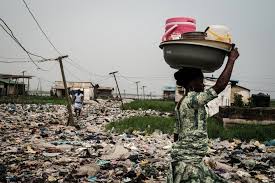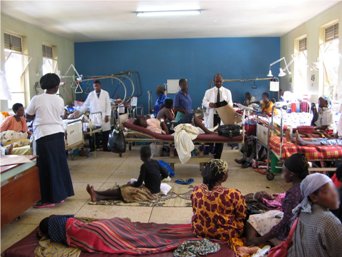Articles
 I entered into the compound of my friend Abdul without the usual obstruction mostly caused by falling cables at the entrance of the compound. The silence in the compound further testified to the existence of a new normal within the compound.
I entered into the compound of my friend Abdul without the usual obstruction mostly caused by falling cables at the entrance of the compound. The silence in the compound further testified to the existence of a new normal within the compound.
Most people are still in the doubt regarding the reality of corona virus. What evidence do you want to see? The confirmed cases? The recovery cases or the death cases? They are all in thousands. The Corona virus is presently tormenting the most sophisticated countries and gradually creeping into the developing countries with little or no health facilities
Surprisingly, the virus started it's attack on the influential groups of Nigeria because of international engagements in countries with high cases of Covid-19. Ironically, the disease is not a respecter of your poor status nor rich status except you follow the basic rules to avoid contracting it.
The idiosyncracy of the African blood being stronger has been demystified.
Covid-19 disease is unprecedented and it has brought several countries to an unimaginable status.
Lest it does not get to the poor in Nigeria who can not afford the test process, the ventilator among other needs.
The poor must respect and activate social distancing, hand washing, controlled sneezing and the most difficult of it, staying at home. Though for someone who earns daily what he or she consumes, this current debacle has become an aberration.
But we are all in this quagmire, lets defeat corona virus, by staying at home for some weeks.
Lets abide to avoid Covid-19 Fatality. The Nigeria economy is in shambles already.

Lagos is the commercial and economic center of the Federal Republic of Nigeria. With a rising middle class, the need for proper health safety measures to purposefully keep the active population and residents of Lagos State economically engaged cannot be overemphasized at this time.
The Lagos State Government had few days ago issued a stay-at-home directive to its residents, in order to curtail the spread of the novel coronavirus, Governor Babajide Sanwo-Olu has unveiled a worthwhile economic stimulus package for the indigent and the most vulnerable in the society.
Truth remains that a healthy Lagos State is a prosperous State. In furtherance of its residents support services, the Lagos State government has outlined various intervention packages. The Lagos State government has shown with this latest intervention that it's people are it's greatest asset.
Impressively, the government of Lagos State has ensured proper awareness campaigns on preventive measures requisite for combating the dreaded Coronavirus. The measures include:
- The need for a lock down to curtail the spread of the novel coronavirus.
- The need for proper hygiene as well as proper hand washing
- The need for social distancing
- The need for isolation after coming in contact with an infected individual
- The need to contact the NCDC for serious cases
In line with the lock down imposed by the Lagos State government, a well thought stimulus, which comes in food packs, to be distributed to every local government in the State is aimed at cushioning the effect of the fourteen days stay-at-home directive. This package is directed to the elderly, physically challenged and petty traders most especially those incapable of meeting daily needs.
The Lagos State government stated that each household will comprise a minimum of six inhabitants. Means the government is aiming at reaching the needs of over one million residents in Lagos State.
In order to ensure effective distribution of this package, it is advisable that the Lagos State government RE verifies previously assembled data. It is possible that some residents from the previously collected data may have economically advanced and may not need the handout, may have passed on or may have changed addresses.
Also proper measures should be put in place to ensure proper documentation of those who have received the intervention package. They should as a matter of necessity attach a photocopy of either a Drivers license, International passport, National identity card, or the PVC to the residents service form.
This measure will aid in reducing incidents of package diversion. The returned residents service form, should match the previously captured data. Further more, the ad-hoc staff to be engaged for this exercise should also be adequately empowered to educate residents about the best safety measures to adopt in beating the Coronavirus.
The ad-hoc staff should also reach out via SMS to the residents for any feedback regarding the effectiveness of the exercise. The feedback will aid in proper plan for future engagements.
BY: EMEKA AMOJI OKORO

The Covid-19 pandemic has brought to the fore all that is wrong with the Nigerian health system and the society at large. It has exposed how ill-prepared we are for large-scale emergencies.
This plague has been ravaging China since December 2019. Many countries that had access to the Covid 19 pandemic report scaled up their medical intervention strategies in order to mitigate against unprecedented outcomes. Nonetheless, countries like USA,UK,Spain and Italy never saw it coming, though they had an established prepared Health system.
As at the 21st century, Nigeria is still grappling with lassa fever that broke out in lassa town Borno state in 1969. The government hasn't decisively dealt with management and eradication of Lassa fever since the outbreak in Maiduguri.
Of recent, Lassa fever Killed 177 people in the last out break. In fact a certain medical practitioner by name Dr. Philip died of the infection while treating a patient. How prepared are we in tackling the lethal Corona virus when as a country we haven't properly dealt with Lassa fever that has killed over 150 Nigerians in the past 6 months? Currently, Lassa fever and other minor ailments like Malaria and cholera are killing thousands of Nigerians every year. At the moment, government hasn't shown a concerted effort towards totally eradication.
I think the government needs to also declare a state of emergency on it's health care management system as well as on lassa fever. Could Governments ineptitude towards Lassa fever be as a result of it only ravaging those from very poor communities?
A serious country would have supported a research home and abroad rather than waiting for it to happen every year.
Nigeria currently has 40,000 medical doctors to cater to 200 million Nigeria, it is far below WHO 1 Doctor to 600 citizen. Currently in Nigeria, it is 1 Doctor to 6,000 Nigerians.
I personally give it to our Medical doctors, indeed they have upheld the "Hippocratic Oath" principle. They evermore exhibited more patriotic zeal than our political leaders.

Amid the further spread of novel covid-19 in Nigeria it is instructive to purchase an item to be used by each household but buying beyond what you need now is quite an unacceptable and government needs to wade in as soon as possible,
Government through it agencies need to urgently come out to implement price control in all the states and local government, with the new federal competition and consumer protection commission act 2019, Government through FCCPC can regulate the price of the product.
Nigerians are used to panic buying of fuel not buying of provisions, toiletries and food items, the challenge of panic buying is the price hike that will follow it. a sanitizer that is expected to sell at #500 is now sold at #1,800, the social pressure of Covid 19 is biting harder in Nigeria that each family cannot help it when they see other people buying erratically and purchasing too much stuff, people feel like they should buy too.
According to Bussinesday.ng, a lady called Bidemi said, my mother is asthmatic and I have bought 10 packs of inhaler for her just in case the situation gets worse and prices go up. at Savetheconsumers.org we canvass to Nigeria government to introduce a limit for purchase on fast-moving consumer goods and direct price control on hand sanitizer and face mask.
There is must be continuous education that is no reason to stockpile consumables and food supplies beyond a particular limit. We must all shop responsibly so that everyone has access to the essentials, shops in the UK such as Tesco is allowing shoppers to buy just two packs of certain items such as dried pasta, tinned tomatoes and anti-bacterial cleaning products. Sainsbury's and Asda are limiting customers to three of anyone products, controlling excessive buying in Nigeria will not be out of place in Nigeria.


